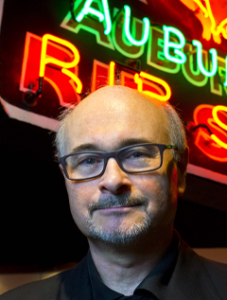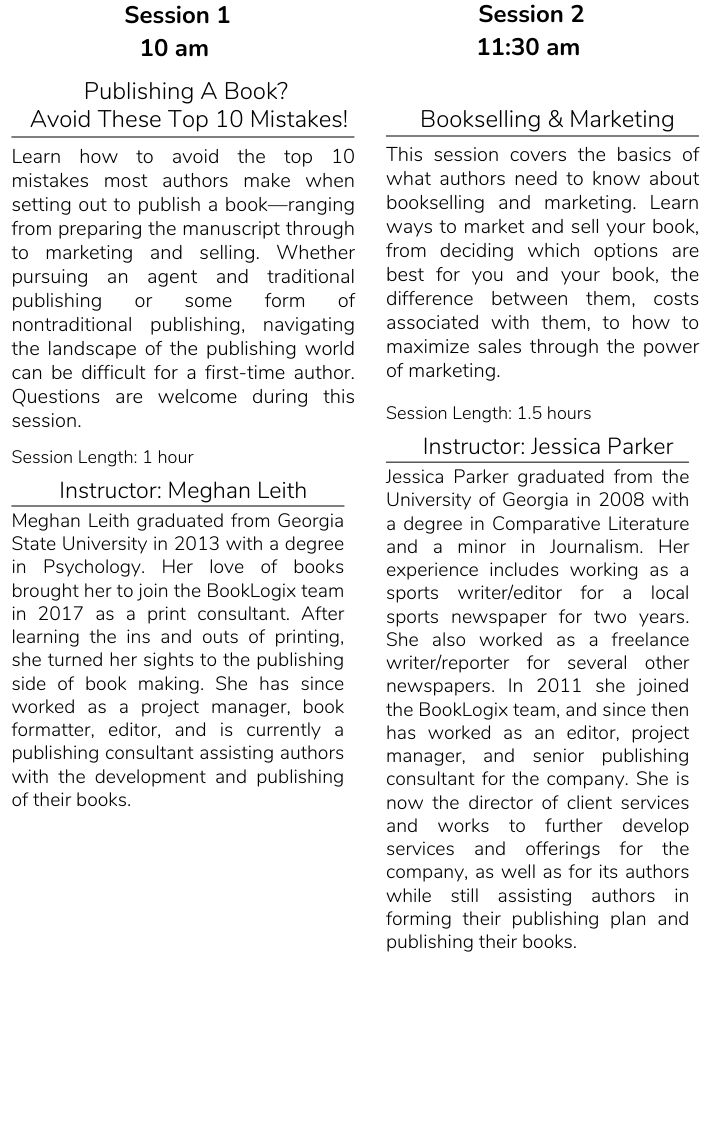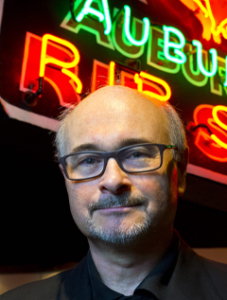3rd Quarter 2024
Dr. Colin Wheeler researches creative discourse in media industries, with a focus on television and advertising in the United States. Remaining a passionate creator and critic, he writes academic articles, makes short experimental films, and teaches at Kennesaw State University. After completing his MFA in Animation at the Savannah College of Art and Design, he went on to earn a Doctorate in Film, Media, and Theater at Georgia State University. A scholar and practitioner of media, he uses his on the ground perspective to study creativity and storytelling as a part of culture and industry.
Description
Writing a story as one goes, or flying by the seat of one’s pants, is as exciting as it is perilous. While a myth may weave a fine yarn with a single narrative thread, today’s modern novels entail multiple entangled storylines. At times, the number of possible outcomes for a scene becomes confusing, as authors struggle to determine what to include. This class offers tools for visualizing the plot through graphing, appraising the story from a distance, while critically distinguishing the substance of the narrative from the form it takes. Breaking down a timeline into events also allows one to consider alternate outcomes to a story with minimal investment in time. Why cut scenes that took hours to write, when one can decide the direction of the story from the start? Participants will learn how to graph a plot, tracing out future and past events, while tracking flashbacks and flash-forwards easily. Mapping the plots of other novels provides insight into what ingredients make a great story, allowing for a new exploration of familiar genres. Rather than relying on plot-typology models which dictate what shape your narrative should take, this class offers narratological tools for understanding, clarifying, and enhancing one’s own story.
2nd Quarter 2024
(Lisa’s) the real deal. Simply awesome. In the last six months, I have learned so much. And more than that, the voice inside my head has changed her tune. Now I hear, “You’re going to do this.”—Emile Horne
Lisa Poisso specializes in working with new and emerging fiction writers. Originally a classically trained dancer, her approach to writing is grounded in structure, form, and technique, applying those dynamics as a writer’s doorway to freedom of movement on the page. Over thirty years as a writer and editor, she has edited and coached developing journalists, writers, and bloggers. She’s been in the trenches as a journalist, magazine editor, managing editor, corporate communications manager, content writer, foreign language and j-school tutor, and communications consultant. She now works exclusively with independent authors and new authors seeking representation.
The Revision Secret
May 18th
10:00 am – 12:00 pm
Description
Authors often get stuck in the revision process. They know their manuscript needs work, but they are unsure what is wrong. They fiddle with comma placement, delete a few words, add different ones, and still don’t feel they have made a significant difference in the literary product.
Renowned editor Lisa Poisso will conduct a Zoom writer’s workshop on Saturday, May 18, 2024, from 10 to noon to address this challenge. The cost is $35. The revision secret is to think like a developmental editor. Using the tools of developmental editing to help guide your revision will not only improve your work but will also improve the chances of getting good reviews, benefiting from word-of-mouth.
Improvement can lead to more sales that contribute directly to your bottom line. In this workshop, we’ll explore how to apply the tools and methods of developmental editing (sometimes called story editing) to your literary work.
The focus is on the big picture, not on sentence-level concerns, although we may make sentence-level edits to address the big-picture concerns. We will cover the main concerns a developmental editor looks for in a manuscript and explore how the building blocks of story (goal-motivation-conflict) can and should play out in a well-constructed novel.
1st Quarter 2024
Instructor
Chris Chandler is a storyteller, author, and book lover. Her memoir, Stay Sweet: Tales of Quirky Southern Love, was published in May 2023. It speaks to family, love and belonging and is her offering of medicine to the world. She is a two-time cast member of Boulder’s Listen To Your Mother show and has been published on ScaryMommy.com and in The Boulder Magazine. Born in Milledgeville, GA, she now lives in Boulder, CO. She helps others find and tell their stories by facilitating writing circles for women.
Writing Unleashed
March 16th
10:00 am – 12:00 pm
Description
Writing Unleashed is a way of writing that helps you dive deep and explore to find your stories.
Have you ever seen a dog unleashed? She’s unfettered, unencumbered. Free to follow her nose from one beckoning scent to another, in a jagged line, constantly turning to what’s most interesting.
The Writing Unleashed approach helps us free ourselves from the inner critic and the thinking mind. By putting pen to page and writing fast without stopping, we welcome what’s flowing through us without pause or judgement. We say “yes” to what’s in the moment and we allow it to flow onto the page This is a discovery practice, a chance to unleashed our deeper creativity onto the page.
From a prompt, we will write for 10-12 minutes and then read our work aloud. And we listen. No comments, no critiques, no discussion. We just listen and witness. We’ll do this for three rounds.
This is a welcoming circle for female-identified writers of any experience level. This workshop will connect you to your authentic voice, helping you reach down to find what you want to say.
3rd Quarter 2023
Creating Impactful Characters
Saturday, September 16, 2023 at 10am – 12pm
Impactful stories start with impactful characters. Every book you’ve ever fallen in love with has at least one character you continue to think about long after you read the last page. In this workshop, we discuss some important aspects of character development that make your characters unforgettable and leave your readers begging for a sequel.
Instructor: Karli Land
Owner, Colorful Crow Publishing
Founder, Calhoun-Cartersville Area Writers
Karli Land has been fascinated with written word since childhood. Through books and stories, she has escaped many grown-up days and hidden herself deep in fairytales.
She grew up climbing orange trees in the small, quaint town of Frostproof, Florida and now resides in Northwest Georgia. While she misses the sandy beaches, she has grown accustomed to watching four seasons come and go each year.
In 2014, she founded the Calhoun Area Writers and proudly watched this small group of friends blossom into a tremendous support system for writers. This year she announced the addition of a sister group- The Cartersville Area Writers.
Karli owns and operates Colorful Crow Publishing, a traditional publishing house that seeks to help talented authors build and promote an author brand to assist in book sales and a lifelong successful writing career.
She enjoys writing in many genres. Her latest book, The Day After Yesterday, is a story of caretaking from the perspective of a daughter caring for her mother in the throes of Alzheimer’s Disease.
While she hopes to sit humbly one day on a best-sellers list, she will settle for a smile or kind word from a stranger.
6-Week Narrative Non-Fiction
Mondays, September 11 – October 16, 2023 at 7pm via Zoom
Description
We all know how to tell a story, yet when it comes to writing one, we often become our own worst enemy. We tell readers what to think and feel. We throw in extraneous details because we have them. We telegraph the ending. Memorable stories do not happen in the inverted pyramid of journalism school; they unfold more like the ghost tales we told as kids. In this six-week course, we’ll learn how to recapture that natural sense of storytelling. We’ll study examples, do some writing, critique each other’s work. In fact, more of the class will be a roundtable workshop as opposed to a lecture.
Each week we’ll focus on a different aspect of nonfiction writing: scene and atmosphere, creating memorable characters, conflict and complication, theme and meaning, voice and style. We’ll also explore one of the hottest topics in modern storytelling: the line between fact and fiction, discussing whether a writer can ever take poetic liberties.
This course should be useful for anyone looking to write a book, a memoir, essays, magazine articles, journalism small or large, or better blog posts. All levels of writers are welcome.
Instructor: Jim Auchmutey
Author,
Smokelore: A Short History of Barbecue in America
The Class of ’65: A Student, a Divided Town, and the Long Road to Forgiveness and
Writer & Editor (retired), Atlanta-Journal Constitution
Jim Auchmutey is a veteran journalist and author in Atlanta. His most recent book is Smokelore: A Short History of Barbecue in America, chosen as one of ten books all Georgians should read by the Georgia Center for the Book — as was his previous book, The Class of ’65: A Student, a Divided Town, and the Long Road to Forgiveness. The latter was featured on C-SPAN and was a New York Times best-seller (briefly — you take your bragging rights where you can get them!). Auchmutey was a reporter and editor at The Atlanta Journal-Constitution for almost 30 years, where he was twice named the Cox newspaper chain’s writer of the year and won a James Beard Foundation award for his food writing. He has taught narrative nonfiction writing at the Decatur Writers Studio and has lectured at Wofford College and Georgia State University.
2nd Quarter 2023
Instructor: Bill Walsh
Director, Creative Writing Reinhardt University
Editor, James Dickey Review
Top 15 Things You Need to Know to be a Successful Writer
Saturday, May 6, 2023 at 10am – 12pm
I’ve Finished Writing. Now What?
Saturday, January 21, 2023 at 10am – 1pm














 About the Book: First cousins Ellison (Eli) Winfield and Adeline (Delia) Green are meant to grow up happily and innocently across the street from one another amid the supposed wholesome values of small-town Green Branch, South Carolina, in the 1960s and 70s. But Eli’s tragic accident changes the trajectory of their lives and of those connected to them. Shunned and even tortured by his peers
About the Book: First cousins Ellison (Eli) Winfield and Adeline (Delia) Green are meant to grow up happily and innocently across the street from one another amid the supposed wholesome values of small-town Green Branch, South Carolina, in the 1960s and 70s. But Eli’s tragic accident changes the trajectory of their lives and of those connected to them. Shunned and even tortured by his peers







